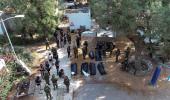The Maltese resolution envisages a win-win situation, which the two parties fail to see in their mood to bring each other to book.
It may well mark the beginning of the end of war, predicts Ambassador T P Sreenivasan.

Tiny Malta went down in history as a ray of hope for humanity when it managed to persuade the cynical members of the United Nations Security Council to stress humanitarian principles of humanity, impartiality, neutrality, independence and the obligation to respect and protect humanitarian relief personnel.
These principles are like motherhood, rarely challenged by anyone, but nations who occupy the horse shoe table consider them dispensable when the world faces existential challenges.
They remain insensitive to the massacre of civilians and turn away from the massive tragedy in the theatres of war like Russia and Ukraine, Israel and Gaza.
For the first time in many years, a vote was cast in the Security Council in favour of an extended humanitarian pauses and corridors throughout the Gaza Strip.
Powerful nations like the US, Russia and the UK abstained, perhaps out of a sense of shame in vetoing a resolution which was a flash of conscience in an area of darkness.
Mercifully, a liberal interpretation of the veto that abstention by permanent members would be counted as positive, the resolution scraped through, giving a ray of hope that the Security Council might act decisively in extremely precarious situations.
The preambular paragraphs of the resolution consist of a careful selection of accepted language in the UN Charter and elsewhere, but one can sense the struggle of the authors to choose the phrases, which would not offend anyone.
But it is clear that the eventual outcome makes all the countries equally unhappy.
The categorical rejection of forced displacement of the civilian population, including children in violation of humanitarian law must have been painful for Israel, but it is balanced by an unequivocal demand for immediate and unconditional release of all hostages held by Hamas.
Nothing good has happened several days after the resolution was adopted, but the operative paragraphs open up several windows of opportunity for the future.
The stress is on humanitarian efforts, but the resolution identifies the action required without anyone making concessions that affect their national priorities.
Killing by itself is of no interest unless they give the warring factions some tactical advantages.
It is clear that Israel is on a revenge drive, which only adds to the bitterness.
On the other hand, cessation of hostilities under any pretext will eventually end conflict.
The Maltese resolution envisages a win-win situation, which the two parties fail to see in their mood to bring each other to book.
It may well mark the beginning of the end of war.
If a humanitarian process saves lives and Israelis get their hostages back, neither side loses on the principles that they are fighting for, such as the two nation solution or the overall security of Israel.
Considering the voting pattern and the statements made, it is obvious that the Maltese delegation engaged all the members of the Security Council individually as there was no P-5 position, no Nonaligned Movement position or others.
For Malta to have accomplished this feat of a resolution without even the threat of a veto speaks highly of the Maltese delegates at the UN.
The fact that Malta had no axe to grind may also have been a factor in its success.
Curiously, an oral amendment was made by the Russian delegation, which it described as "the lowest common denominator, lower than what the Council cannot allow."
The amendment was to add a reference to Paragraph 1 of a General Assembly resolution referring to 'illegal Israeli actions in Occupied Palestinian territories'.
The oral amendment was defeated by a vote of 5 in favour, 1 against and 9 abstentions, obviously because several delegations did not want to disturb the delicate balance of the Maltese text.
The UAE delegate waxed eloquent on Malta's effort by stating that what emerges from the ruins of Gaza may be the last chance for the Council members to save it.
Malta expressed the hope that "our votes today translate into lives, the lives of thousands of children, civilians and heroic humanitarian workers."
The Council adopted resolution 2712(2023)by a vote of 12 in favour to none against with 3 abstentions (Russia, UK, USA)

The US stated after the vote that it did not vote against the resolution because it worked with others to adopt a resolution on the war situation.
But it also said that it was horrified that a few Council members cannot bring themselves to condemn the terrorist attacks that Hamas carried out against Israel on Oct 7.
Like the UK, the US also highlighted the demand for release of the hostages by Hamas.
The Russian delegate remarked that 'humanitarian pauses are not and cannot be a replacement for a ceasefire or even a truce.'
China remarked that the Council should have adopted a more comprehensive and more robust resolution much earlier.
The reason why it did not happen was the obstructionist attitude of the US.
China characterised the adopted resolution as a first step towards a ceasefire, averting even a greater catastrophe.
The Observer for the State of Palestine regretted that the UN did not ask for a stop to the killing, particularly civilians including women and children. The Israeli narrative of killing should not prevail.
'There is an alternative reality in which Palestinians are free and no Palestinian and no Israeli is killed. It is time for it to prevail. It is time for peace.'
Israel stated that no resolution, which did not restrain Hamas, would create peace.
'Should Hamas choose to lay down their arms, turn themselves in and hands over the hostages unscathed, this war would end immediately.'

Even a week after the historic resolution was adopted, the situation on the ground has not changed for the better. No pause in the battle has taken place.
The attack on the only remaining hospital in Gaza has resulted in more casualties.
But moves for a ceasefire have gained momentum, perhaps as a result of a slight movement within the Security Council to seek a solution through a humanitarian pause.
The Security Council acted on the premise that an imperfect resolution is better than no resolution, but as a first step, it may well have initiated a process for peace.
Unlike in the case of the Russia-Ukraine war, the Security Council has not remained paralysed over the Israel-Hamas conflict.
Ambassador T P Sreenivasan is a frequent contributor to Rediff.com.
You can read his earlier columns here.
Feature Presentation: Aslam Hunani/Rediff.com











 © 2025
© 2025